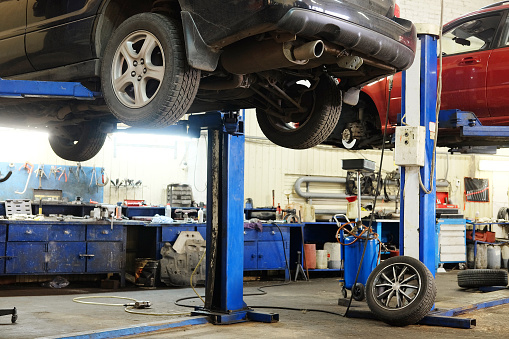Featured
When it comes to vehicle maintenance, the brakes are perhaps the most important system for ensuring your safety. Normal brake inspections are essential to keeping your braking system in leading condition.
- Why Brake Examinations Are Essential. Brakes are made to wear down with time, yet without normal assessments, you might not see when they come to be less reliable. A defective brake system can lead to severe accidents, increased fixing prices, and also the demand to replace other automobile elements.
Brake assessments not only assist you catch possible issues prior to they rise, but they also enable far better braking efficiency, increased automobile lifespan, and improved safety.
- Identifying Caution Signs for Brake Issues. While routine examinations are vital, you do not need to wait up until your automobile's following check out to the auto mechanic. View for these indication that may indicate it's time for an assessment:
Unusual Sounds: A piercing screech or grinding sound when using the brakes frequently indicates that the brake pads are put on down or harmed. Soft or Mushy Brake Pedal: If the brake pedal really feels soft or spongy when pushed, there may be air or moisture in the brake lines, or the brake liquid might be low. Pulling away: If the vehicle draws to one side while stopping, it can indicate uneven brake pad wear or a hydraulic concern in the brake system. Vibration in the Wheel or Pedal: If you experience vibration or pulsation when stopping, it might signify distorted rotors or irregular brake pad wear. Boosted Stopping Distance: If it takes longer than typical to bring your car to a stop, it may be time to inspect the brake pads, liquid levels, or blades. If you observe any one of these signs, it's finest to have your brakes examined instantly by a professional.
- Secret Components Checked Throughout a Brake Examination. Throughout a brake examination, a licensed technician will analyze several vital elements of the brake system to guarantee they're functioning correctly. A few of one of the most integral parts to examine include:
Brake Pads: These are the friction product that presses against the brake rotor to slow down the car. Over time, the brake pads use down and require replacing. Brake Rotors: Rotors are the metal discs that the brake pads secure down on. They ought to be smooth and without deep grooves or splits. Brake Liquid: The brake liquid moves the pressure from the pedal to the brakes. Reduced fluid levels or old, polluted liquid can cause bad braking performance. Brake Lines: Brake lines lug fluid from the master cyndrical tube to the brake parts. They must be checked for leakages, splits, or damage. Brake Calipers: These secure the brake pads onto the blades. They should remain in great working order and cost-free of leaks. Consistently inspecting these components guarantees your stopping system operates efficiently and helps you prevent unsafe driving circumstances.
- Just how Frequently Should You Obtain Your Brakes Evaluated? The regularity of brake inspections depends upon your driving habits and the sort of automobile you own. As a basic standard, it's advised to examine your brakes at the very least annually or every 12,000 miles. However, if you drive in rush hour, frequently carry heavy tons, or drive on uneven surface, more frequent evaluations might be needed.
It's additionally a good idea to have your brakes examined if you discover any of the caution indications discussed previously, as this can avoid much more significant concerns.
- The Cost of Disregarding Brake Inspections. Disregarding regular brake examinations can result in serious effects. Worn brake pads, damaged rotors, or reduced brake liquid can trigger your stopping system to stop working when you need it most. Along with the safety and security risks, overlooking brake maintenance can result in pricey repair services later on.
As an example, if the brake pads are not replaced in time, the damage could include the blades, leading to the need for blades replacement-- a pricey repair service. By organizing routine brake examinations, you can avoid these pricey repairs and keep your stopping system in great problem for longer.

- What Happens During a Brake Inspection? An expert auto mechanic will certainly execute a comprehensive examination of your automobile's stopping system, including checking for the following:
Brake Pad Density: Brake pads require to be changed when they have actually put on down to a particular thickness. Blades Problem: The technician will examine the blades for signs of wear, bending, or scoring. Brake Liquid Level: Low brake fluid can impact braking performance. The mechanic will check the fluid level and restore it if needed. Brake Line Honesty: The brake lines will certainly be inspected for any kind of leaks or splits that could jeopardize the brake system. Once the evaluation is total, the auto mechanic will certainly educate you of any type of required fixings or substitutes.
Final Thought: Stay Safe with Normal Brake Inspections. Your brakes are vital to keeping you and your travelers risk-free on the road, so normal brake inspections must never be overlooked. By taking notice of warning signs, scheduling periodic brake checks, and dealing with concerns quickly, you can ensure that your brakes are always in top shape.
Do not wait until your brakes stop working-- remain positive regarding brake maintenance. A little financial investment in brake evaluations today can save you from expensive fixings and dangerous scenarios in the future.
Latest Posts
Find Outstanding Car Repair Services offered by Montclare Auto Repair – Keep Your Car Running Smoothly
Safeguard Your Home with Quality Residential Roof
Unlock Your Partner at WyHy Maximizes Your Savings on Borrowing and Banking
More
Latest Posts
Find Outstanding Car Repair Services offered by Montclare Auto Repair – Keep Your Car Running Smoothly
Safeguard Your Home with Quality Residential Roof
Unlock Your Partner at WyHy Maximizes Your Savings on Borrowing and Banking
